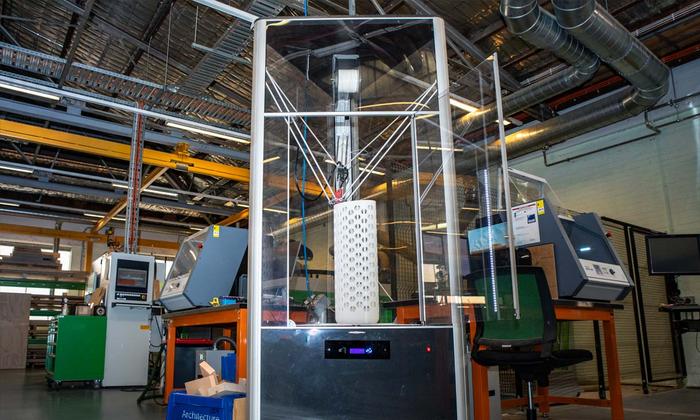The Safety Sensescaping project, funded by WorkSafe’s WorkWell Mental Health Improvement Fund, is part of Peninsula Health’s Thriving in Health program, which aims to create safe and mentally healthy environments for healthcare workers to thrive in.

Credit: RMIT University
The Safety Sensescaping project, funded by WorkSafe’s WorkWell Mental Health Improvement Fund, is part of Peninsula Health’s Thriving in Health program, which aims to create safe and mentally healthy environments for healthcare workers to thrive in.
Project lead and RMIT Senior Lecturer Dr Olivier Cotsaftis worked with doctors, nurses and non-clinicians at Peninsula Health for three years to understand the psychosocial hazards in their workplace and find design-led solutions to prevent mental injury.
Cotsaftis said hospital scrubs were an unconscious source of stress for many healthcare workers.
Designed according to the standard male or female body, scrubs do not typically accommodate the wide range of body shapes and sizes.
Scrubs are also often made from scratchy synthetic materials, which can cause the wearer to overheat quickly.
“Many workers don’t realise how being uncomfortable in scrubs can add extra stress to an already stressful job,” said Cotsaftis, from RMIT’s School of Design.
“Some workers we spoke to said their scrubs felt suffocating during highly stressful situations.”
Cotsaftis said having comfortable scrubs that were tailored to an individual’s body was an effective way to improve the mental health of workers.
“In a job where there is little control over what you do, feeling comfortable in your uniform and how you present yourself can help a person reclaim a sense of their identity,” he said.
Starting with body scanning technology to map out the body’s measurements, Cotsaftis then used 3D-knitting technology to create the scrubs.
Using yarn made from a blend of organic cotton and Seacell, an algae-based cellulose material, the final prototype was a breathable, comfortable and well-fitted set of scrubs, which were a hit with staff at Peninsula Health, said Cotsaftis.
Nurse Erin Colgan, who tested Cotsaftis’ prototypes, said she was not aware of how negatively her generic navy scrubs impacted her mental health until she was involved in the Safety Sensescaping project.
“This project has made me understand the impact scrubs and uniforms have on mental health and I have decided to change how my scrubs make me feel,” she said.
Cotsaftis is hoping to work with tech companies to fine-tune the 3D knitting and make the process more streamlined. He is also hoping to source new yarns made from organic waste to make the scrubs more sustainable.
Sound absorbing furniture
Cotsaftis said the demanding nature of healthcare work meant staff were often unable to take restful breaks as there were a lack of private resting spaces.
“Many healthcare workers take breaks wherever they can, but there may not be any seats to sit on or they might lack privacy,” he said.
“They’re also subjected to lots of noise pollution, which makes it difficult for them to de-stress.”
Working within these constraints, Cotsaftis designed a suite of portable, modular, cost-effective and sustainable 3D-printed furniture.
The furniture could be printed on demand when needed by the hospital, and industrially composted at the end of its life.
Most importantly, the furniture was sound absorbing, said Cotsaftis.
The prototypes were made from corn polylactic acid (PLA), a compostable and carbon-neutral natural plastic, and recycled paper for its sound-absorbent properties.
Cotsaftis’ furniture design includes the use of rounded patterns, allowing sound to travel through the furniture rather than bounce off the surface.
Preventing mental injury in health care
According to WorkSafe, psychosocial hazards are factors in work that increase the risk of work-related stress, which can lead to psychological or physical harm.
Psychosocial hazards can range from low job control, poor environmental conditions to violent or traumatic events in the workplace.
WorkSafe Victoria Executive Director External Affairs Sam Jenkin said the Mental Health Improvement Fund supported initiatives that prevent work-related mental injury through system-level change.
“Thriving in Health’s prevention-focused initiatives will share knowledge and resources to support more than 100,000 frontline healthcare workers across Victoria,” Jenkin said.
“As a community we need to look after the workers who look after us, sadly healthcare workers face increased risk of mental illness and injury – especially those who provide frontline care.”
“WorkSafe has accepted nearly 13,000 claims from the Healthcare and Social Assistance sector in the past three financial years, with 17.7 per cent of these for mental injuries.”
Design – more than just aesthetics
Cotsaftis said his research with Safety Sensescaping highlights how human-centred design can change our approach to creating products, services, strategies and policies to tackle the growing issue of mental wellbeing in the workplace.
“Design is often misunderstood as form and aesthetic, but it also includes the broader systems we sometimes interact with, such as health care,” he said.
“What we’ve designed is not just innovative scrubs or furniture, but a design strategy that can be used to tackle any work-related factors contributing to poor staff mental wellbeing in health care.”
“2023 Safety Sensescaping Research and Engagement Report” and “Thriving in Health: Safety Sensescaping – A design approach to workplace mental health” were prepared for and published by Peninsula Health’s Thriving in Health program.
The research was led by Dr Olivier Cotsaftis from RMIT University in collaboration with Peninsula Health and supported by WorkSafe’s WorkWell Mental Health Improvement Fund.
Method of Research
Case study
Subject of Research
People
Article Title
Thriving in Health: Safety Sensescaping – A design approach to workplace mental health
Article Publication Date
17-Jul-2023
COI Statement
This resource was created in collaboration with Dr Olivier Cotsaftis from the RMIT University School of Design as part of the Thriving
in Health project. The Thriving in Health project is supported by WorkSafe’s WorkWell Mental Health Improvement Fund.




